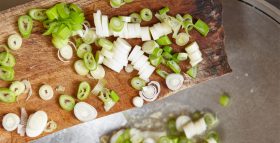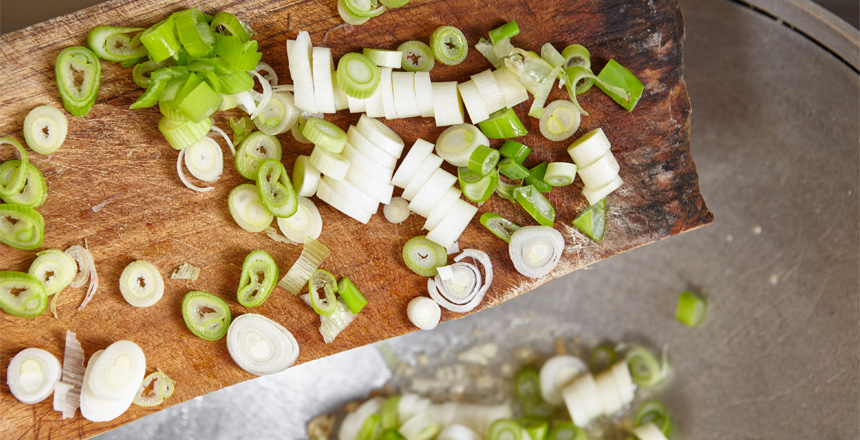About a year after my dad died, I read an article in the paper about a man in Texas who was being executed that day.
They described his request for his final meal, and it got me thinking about what I’d request for mine. The answer was obvious: my dad’s chicken chow fun. I burst into tears. Until that moment, it hadn’t occurred to me that I wouldn’t be eating his chow fun for the rest of my life.
Related
My dad was a Bronx-born Jew and a whiz with the wok. Many nights a week he cooked our dinner, and those dinners frequently included garlic, ginger, and soy sauce. The big winner was his chow fun: wide, flat rice noodles, tons of slippery sweet onions, crunchy scallions, and hunks of dark meat chicken. He worked for New York City, and he’d sometimes have meetings at City Hall and would walk home through Chinatown, buying ingredients for chow fun on the way. I’d return home ravenous from ballet class or play rehearsal, instantly recognize the aroma greeting me at the door, and be psyched.
When I was 25, my Dad got unexpectedly sick, fought like hell in the hospital for seven months, and then died. On the fifth anniversary of his death, I decided to recreate his most delicious dish. I had never watched him make it with any attention to the details, but I am a food obsessive and if I closed my eyes, I was pretty sure I could see it perfectly. I took the subway to City Hall, and walked up to Chinatown, retracing what I imagined were my father’s footsteps.
As I walked, I pictured him in his baggy work suit, jingling the change in his pockets, his leather briefcase hanging from his hand. I pictured him whistling something upbeat and complicated, as he did, and hunting for the greenest snow peas and the freshest bean sprouts. I grabbed a knob of ginger, snagged a bunch of scallions. Easy.
The noodles, though, were tough to find. When I finally located them outside a corner shop, I thought: “If this is the only place selling these, then I am definitely where my Dad was.” This sort of thinking, the scavenging for connection with the dead—“He was here! He ate this!” —it’s familiar to all of us who have lost someone. When he was alive I couldn’t have cared less about where he bought noodles, hadn’t thought to care what his meetings were about at City Hall, hadn’t ever asked him where he learned to make chicken chow fun. Once he was gone, every detail was fascinating.
I hauled the ingredients to my mom’s house (formerly known as “my parents’ house”), took down the wok, which had not been used in more than a year, and got to work. The dish wasn’t perfect, but it turned out pretty well. Eating it transported all of us: me, my mom, and my brother.
This was the beginning of a tradition. Every year, on March 21 or thereabouts, I try to make the dish for them. We all miss him terribly, but we don’t really know how to talk about him; we’ve struggled with it for all this time. But this? This I know how to do. How to slip into my father’s skin, to cook with ease and feed my loved ones, to embrace the ways in which he and I are alike—ways I hadn’t seen or understood at the time.
This year, 15 years after he died and on what would have been his 70th birthday, my mom asked me to make my dad’s chicken chow fun for my niece and nephew. They are four and six years old and never had the luck of knowing him, but they know him by name and probably see that the rest of us get quiet and full of reverence when we talk about “Grandpa Peter.”
I pulled out the bag of rice noodles, the garlic, the knob of ginger. My nephew stood at my hip and watched me slice vegetables and fry it all up in the wok. He then sat between me and my mom and happily gobbled up his bowl of food, proclaiming it “delicious,” but having too many onions. All these years later, I am still perfecting the recipe.
Jerusha Klemperer is a Co-founder and the Communications Director of FoodCorps, an organization that connects kids to real food and helps them grow up healthy. You can find her musings about food on Twitter at @eathere2.












